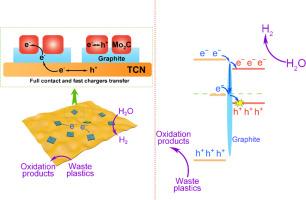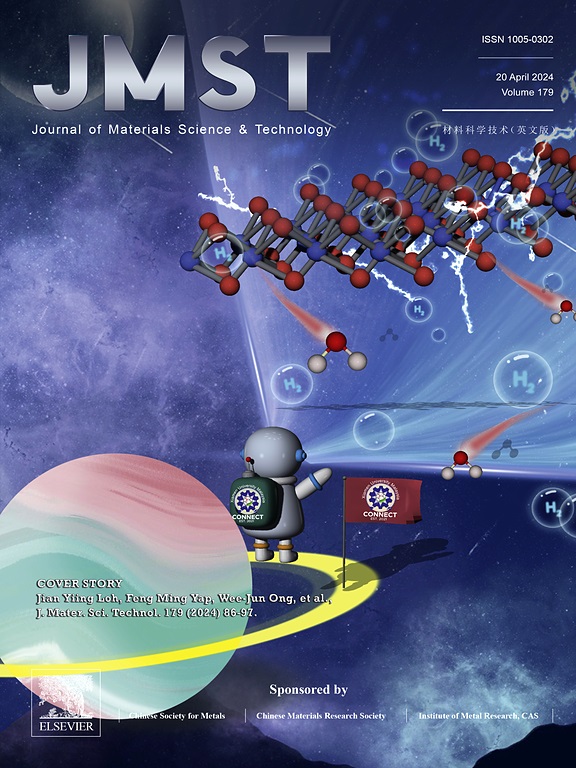构建 Mo2C/C/TCN 异质结,实现高效的无惰性金属塑料光成形和制氢
IF 11.2
1区 材料科学
Q1 MATERIALS SCIENCE, MULTIDISCIPLINARY
引用次数: 0
摘要
光催化分水将太阳光直接转化为可储存的 H2,但通常需要使用空穴牺牲剂和贵金属共催化剂,导致能源浪费和成本增加。在此,我们报告了一种 Mo2C/C/TCN 异质结,通过组合系统同时实现 H2 生成和塑料重整,从而克服了上述不足。Mo2C/C/TCN 由嵌入噻吩的聚合氮化碳(TCN)和锚定在纳米石墨片上的碳化钼(Mo2C/C)组成,通过静电自组装制备而成。在异质结中,TCN 充当电子供体,Mo2C 充当电子受体和 H2 演化活性中心,而 Mo2C/C 中的石墨(C)则充当电子传输介质。与原始聚合氮化碳(CN)相比,Mo2C/C/TCN 的异质结构大大提高了催化剂的可见光利用效率以及光诱导电荷分离和迁移效率。因此,Mo2C/C/TCN 表现出令人满意的可见光驱动废塑料光转化能力和高 H2 生成活性。经过优化的 Mo2C/C/TCN 光催化 H2 演化率达到 188.7 μmol h-1,是 10 vol% 三乙醇胺(TEOA)中 Pt/CN 光催化 H2 演化率的 7.1 倍,远远领先于已报道的研究。此外,Mo2C/C/TCN 在可见光下对聚乳酸(PLA)和双酚 A(BPA)的光转化效率也很高。这项工作为降低成本、增强光吸收和抑制电荷重组提供了一种有效的方法,从而提高了光催化性能并扩大了应用范围。本文章由计算机程序翻译,如有差异,请以英文原文为准。

Building Mo2C/C/TCN heterojunction for efficient noble-metal-free plastic photoreforming and hydrogen generation
Photocatalytic water splitting converts sunlight directly to storable H2, but commonly involves the use of a hole sacrificial agent and a noble metal cocatalyst, leading to the waste of energy and increasing cost. Herein, we report a Mo2C/C/TCN heterojunction for overcoming these shortages through a combination system to realize H2 generation and plastic reforming at the same time. Mo2C/C/TCN, consisting of thiophene-embedded polymeric carbon nitride (TCN) and molybdenum carbide anchored on graphite nanosheet (Mo2C/C), was prepared via electrostatic self-assembly. In the heterojunction, TCN performed as an electron donor, Mo2C acted as an electron acceptor and H2 evolution active center, while the graphite (C) in Mo2C/C served as an electron transport medium. Owing to its hetero-structure, the visible light utilization efficiency as well as photoinduced charge separation and migration efficiency of the catalyst Mo2C/C/TCN were greatly strengthened compared to the pristine polymeric carbon nitride (CN). As a result, Mo2C/C/TCN exhibited satisfactory visible-light-driven waste plastic photoreforming and high H2 generation activity. The optimized photocatalytic H2 evolution rate over Mo2C/C/TCN reached 188.7 μmol h−1, which was 7.1 times of that over Pt/CN in 10 vol% triethanolamine (TEOA), far ahead of the research that has been reported. Additionally, Mo2C/C/TCN exhibited adorable photoreforming efficiency of polylactic acid (PLA) and bisphenol A (BPA) under visible light. This work provides an efficient approach for lowering cost, enhancing optical absorption, and inhibiting charge recombination for higher photocatalytic performance and wilder applications.
求助全文
通过发布文献求助,成功后即可免费获取论文全文。
去求助
来源期刊

Journal of Materials Science & Technology
工程技术-材料科学:综合
CiteScore
20.00
自引率
11.00%
发文量
995
审稿时长
13 days
期刊介绍:
Journal of Materials Science & Technology strives to promote global collaboration in the field of materials science and technology. It primarily publishes original research papers, invited review articles, letters, research notes, and summaries of scientific achievements. The journal covers a wide range of materials science and technology topics, including metallic materials, inorganic nonmetallic materials, and composite materials.
 求助内容:
求助内容: 应助结果提醒方式:
应助结果提醒方式:


